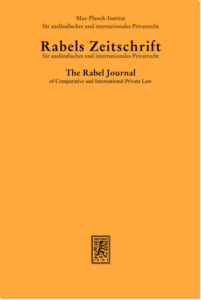RabelsZ 86 (2022): Issue 3
 The latest issue of RabelsZ has just been released. It contains the following contributions:
The latest issue of RabelsZ has just been released. It contains the following contributions:
OBITUARY
Jürgen Basedow: Ulrich Drobnig *25.11.1928 †2.3.2022, 571–576, DOI: 10.1628/rabelsz-2022-0052
ESSAYS
Daniel Gruenbaum: From Statehood to Effectiveness: The Law of Unrecognised States in Private International Law, 577–616, DOI: 10.1628/rabelsz-2022-0053
One of the functions of private international law (PIL) is to determine the law that governs a legal relationship. Yet what occurs when the rules designated by PIL emanate from an entity that has not been recognised as a state by the government of the forum? This article aims firstly to identify and describe the major prevailing approaches to applying the law of unrecognised states in contemporary PIL practice. It then critically appraises the principal reasons justifying the application of foreign law despite it emanating from unrecognised states. The article finally argues that applying the law of unrecognised states reveals the potential for PIL to grapple with non-state rules and with interactions of normative orders of all different sorts, regardless of their state pedigree.
Matthias Fervers: Die Drittwirkungen der Forderungsabtretung im Internationalen Privatrecht, 617–643, DOI: 10.1628/rabelsz-2022-0054
Third-Party Effects of Assignments of Claims in Private International Law. – Although Art. 14 Rome I Regulation addresses the relationship between the assignor and the assignee as well as the relationship between the assignee and the debtor, there is still no provision as to the third-party effects of assignments. The question of what law should govern these third-party effects is, correspondingly, a subject of considerable discussion. While some propose that the law governing the assigned claim should be applicable, others suggest that third-party effects should be governed by the law that applies to the contract between the assignor and the assignee; the current prevailing opinion assumes that third-party effects should be governed by the law of the habitual residence of the assignor. This article demonstrates that a limited possibility for a choice of law for assignor and assignee is the most appropriate solution.
Christoph Wendelstein: Der Handel von Kryptowährungen aus der Perspektive des europäischen Internationalen Privatrechts, 644–686, DOI: 10.1628/rabelsz-2022-0055
The Trading of Cryptocurrencies from the Perspective of European Private International Law. – The rules in the Rome I Regulation are used to ascertain the applicable law in cases of trades in cryptocurrencies. However, these are only partially appropriate for a predictable determination of the applicable law. While in B2B and C2C cases of “stationary” trading of cryptocurrencies via Crypto-ATMs the law at the location of the ATM still provides a predictable legal system, this is not the case for online trading with crypto-brokers or via crypto exchanges. Especially in cases of online trading via crypto exchanges, a further complication results from the fact that such platforms allow their users to trade legally under a pseudonym – in line with the historical notion of cryptocurrencies. This may complicate or even prevent the determination of the applicable law. The resulting “vacuum” is to some extent filled by the technical design of the transaction through the use of smart contracts. However, this does not dispense with the question of applicable law. The article examines these and other questions and points out possible solutions de lege lata.


